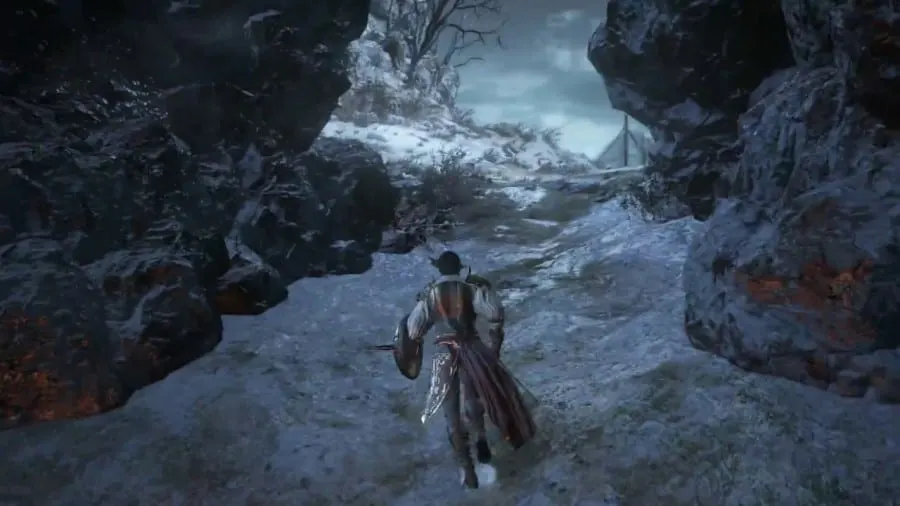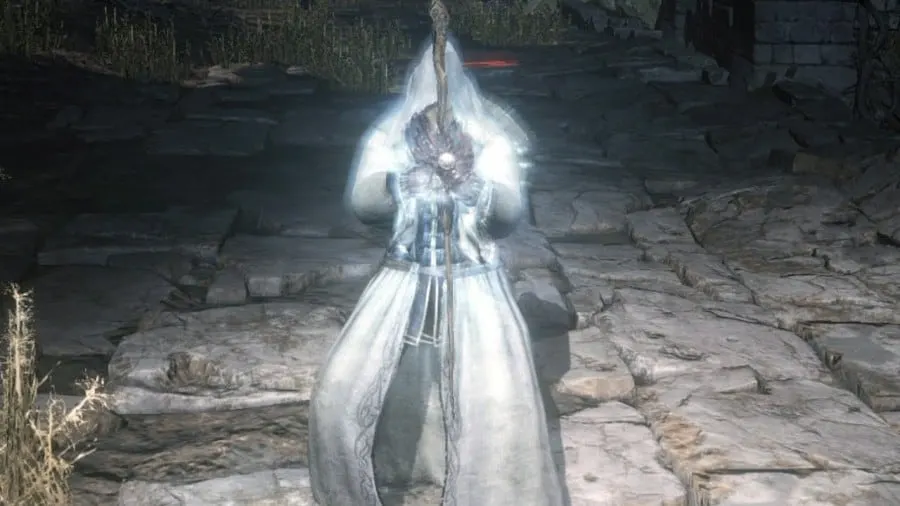Sorcerer is one of the starting classes in Dark Souls. While most of the starting classes in Dark Souls 3 focus on melee damage, Sorcerers are optimized for magic-based combat.
The class is one of the three primary class types: rouge, knight, and Sorcerer. Because of this, it has a universal appeal that draws a lot of new players toward it. I’m willing to bet that if this is your first DS3 run, you generally play a mage in other RPGs.
Sorcerers have the highest intelligence and attunement in the game. This is great regarding your magic damage output and the range of spells you can access quicker. It also has the lowest vigor out of any starting class.
Effective Sorcerer Combat
On the positioning, how you operate combat encounters as a Sorcerer is much more difficult than with other classes. While it’s true that you can’t go charging into a fight with a knight, you need to remember that you’re a lot more squishy.
Long and painful story short, you must pay attention to your enemies and where you are. There will be a learning curve to this, so take your time. Realizing the speed and attack range of enemies, in particular, will be important.
Understanding this will allow you to be defensive and offensive with your cast walking. If you’re out of range but know you can kill an enemy before it reaches you, move up; if not, back down.
This might sound counterintuitive but try to move into range of your target after you cast your first spell. “Why,” I hear you ask. Well, because it will allow you to get off an extra spell.
If you move and time your lock-on correctly, you won’t be noticed with your first spell, letting you fire another before you have to take the defensive. Remember that you shouldn’t do this all the time, but it can help in certain niche situations.
Lastly, let’s talk about dodging. You’re no battle mage, so getting up close to the enemy is unideal but unavoidable. There will be times, and many of them, when you’re casting a spell and realizing that big bad is about to rush you and pound you into a wall.
At the start of your journey, you will receive that pounding. But as you get a better feel for your cast times, you can start timing your dodges to frame perfectly. If you cast and then start spamming your dodge immediately, you should be able to get out of the way of a charging enemy just in time.
As well as that, make sure you twice every time you’re getting out of the way of an attack. Yes, this is going to drain stamina. No, this isn’t debatable. You should be trying to hit that dodge twice every time.
As a sorcerer, you need some distance between you and your enemy. You need time to get your spell cast off and dodge out of the way of the next attack. Most of the time, a single dodge isn’t give you that distance, but two dodges will.
Sorcerer Essential Steps

Sorcerers are tricky little beasts compared to the other starting classes from Dark Souls 3. In particular, you will need to learn how to manage your resources.
But first, be aware that you’re using no shields. It should be fairly obvious why we’re forgoing using a shield with our thin, frail Sorcerer, so I’m not going to insult you by elaborating on it.
I will elaborate on the three depletable resources that make up the cogs and gears of your Sorcerer build. Stamina, health, and focus are the three standard bars you should use in all RPGs. Specifically, I want to draw your attention to focus, also known as mana. Managing this blue bundle of joy will be key to mastering a Sorcerer’s playstyle, much more than stamina or health.
Why focus is so much more important than health is a hot topic. If you disagree with me, build your Sorcerer however you like, but this is my stance. As a spell caster, you want to focus on not getting hit instead of being able to take a hit. You should keep your enemies at range; if you’re not, you’re playing Sorcerer wrong.
You can make a bigger case for stamina, and I tend to pump some points into it later in the build, but you don’t need it as much as focus. If you know how much of your bar each action takes and keep your third eye on it throughout your fights, you will not need to increase it all that much.
Focus directly affects how many spells you can cast, which is important. We only level it slowly because one other element of your build is even more important. And that’s damage. You’re a mage that shoots magic fireballs out of their hand, so you should be efficient at killing things.
For Sorcerers, the stat that affects your damage is intelligence, so that’s where the majority of our early game focus will be. You want to scale attunement slowly (your focus bar) up to 20 in the early game and around 30 by the time you’re at Yhorm. Everything else goes into intelligence.
You’re a glass cannon, so you’re just a glass noodle without a high intelligence stat. And nobody wants to be a glass noodle.
You can stop pumping points into intelligence at certain milestones depending on what Soul Level you want to finish up at. As a rule of thumb, try to keep the ratio of attunement to intelligence at 1/2.
True Sorcerer Build
I hate to break it to you, but being a mage in Dark Souls 3 doesn’t give you many build options. It’s a weak class if you don’t use the right items or put enough points into the right stats.
It does leave you a little room for getting techy, though. So to avoid giving you a purely on-rails sorcerer build, I will give you the foundations, and you can build on top of that however you want.
Attributes
Int 50 / 60– Intelligence is your most important attribute as a spell caster. We must get it up to 34 (just before the soft cap) before we invest in anything else.
Once you get your intelligence, you can start splashing into your attunement. While leveling that, you can also put some points into vigor or vitality, depending on your playstyle.
Alternatively, you can level up attunement and intelligence simultaneously, at 1 to 2, until attunement is 20. However, I wouldn’t recommend this. Playing an early-game mage without any of your key items and low intelligence will make you cry.
Attunement 30 / 40 – what level you get your intelligence and attunement up to is determined by what Soul Level you’re aiming for, so keep that in mind as you theory-craft your build.
I know I’m flogging a dead horse, but you need to recognize the importance of leveling these two attributes over all others and that you’re using the proper equipment. For better or worse, Sorcerers are underpowered in DS3, so save yourself the pain of using a sub-optimal build.
Equipment and Armor
- Sage Ring – Increases your casting speed.
- Scholar’s Candlestick – Boosts sorceries damage by 10% percent.
- Crown of Dusk – Boosts spell damage by 20% percent.
- Magic Clutch Ring – Increases sorceries damage by 15% percent.
- Young Dragon Ring (you start with this) – Boosts sorceries damage by 12% percent.
- Bellowing Dragoncrest Ring – Increases sorceries damage by 20-ish% percent, depending on the spell.
These items are non-debatable for a sorcerer build. The buffs you get from them give you your main damage, especially later in the build.
Some of these items have other effects, like decreasing your resistance, but that’s not what is important here. All of those damage bonuses stack. So, if you put all of that together with high intelligence, you may be shooting nukes out of your hands.
You can swap out Sage Ring with the Young Dragoncrest, depending on which you prefer, although I’d argue that the Dragon Ring is much more beneficial.
As for armor, it is up to you. If you avoid stumbling into the slow-roll territory, style your mage in whatever looks good. You should at least dabble in the sub-30% percent equip load territory.
Most people don’t care for fast rolls, and that’s okay. Most people don’t need them. However, as a Sorcerer, the range and speed of your maneuvers are much more important than other classes.
With an equip load below 30% percent, you roll faster and further, which can be great for creating that range we keep discussing. It’s by no means vital to the build, though. So if you’re not a fan, that’s no issue.
Spells
Spells are the fun part of any Sorcerer build, not just this one. After all, why are you even playing a mage in the first place if you don’t love the variety of casting different, wonderful ways to slaughter your enemies?
You have a very large pool to pull from when you’re assigning sorceries to your slots, but for a fully optimal build, you should be using the following:
- Great Heavy Soul Arrow
- Crystal Soul Spear
- Soulstream
- Magic Great Sword
- Great Soul Arrow
GHSA and CSS should be included in your spell lineup no matter how you like to play. These two sorceries will be your main damage source, with Crystal Soul Spear particularly useful in boss fights.
The rest of your spells are up for debate. Having the regular Great Soul Arrow hotkeys is a good utility choice. It doesn’t use up as much FP and has a faster cast time, so it tends to be more useful than GHSA in a few situations.
Soulstream and Magic Great Sword are handy for certain fights in the game, although you can go without them. Regardless of your spell setup, just ensure you have GHSA and CSS, and you should be ready.
The Best Overall Options for Sorcery Builds

Your best options for sorcery builds are fairly simple: You need high intelligence, Magic Crest Ring, Bellowing Dragoncrest Ring, and Crown of Dusk. While we’ve aimed to provide you with the most powerful mage foundation possible, there is room to spice it up a little. Just a little, though.
You need your INT and those items to make the build even remotely viable. This is where Sorcerers come up short in DS3. Most other classes have different ways to build and set them up, but you don’t have that luxury here.
Wrap Up
I hope the words of wisdom I’ve imparted come at least somewhat handy during your playthrough.
If my nagging has you thinking about preceding a Sorcerer run, don’t. While it can be challenging, it is also incredibly fun and rewarding.
Sorcery isn’t all about stats and specs, though. You get access to many different spells and playstyles that other classes don’t, so feel free to venture far beyond the constraints our build puts on you.
You can always respect if you don’t like how things are going. Getting a feel for what you enjoy and don’t is infinitely more important than building the most powerful mage possible.

